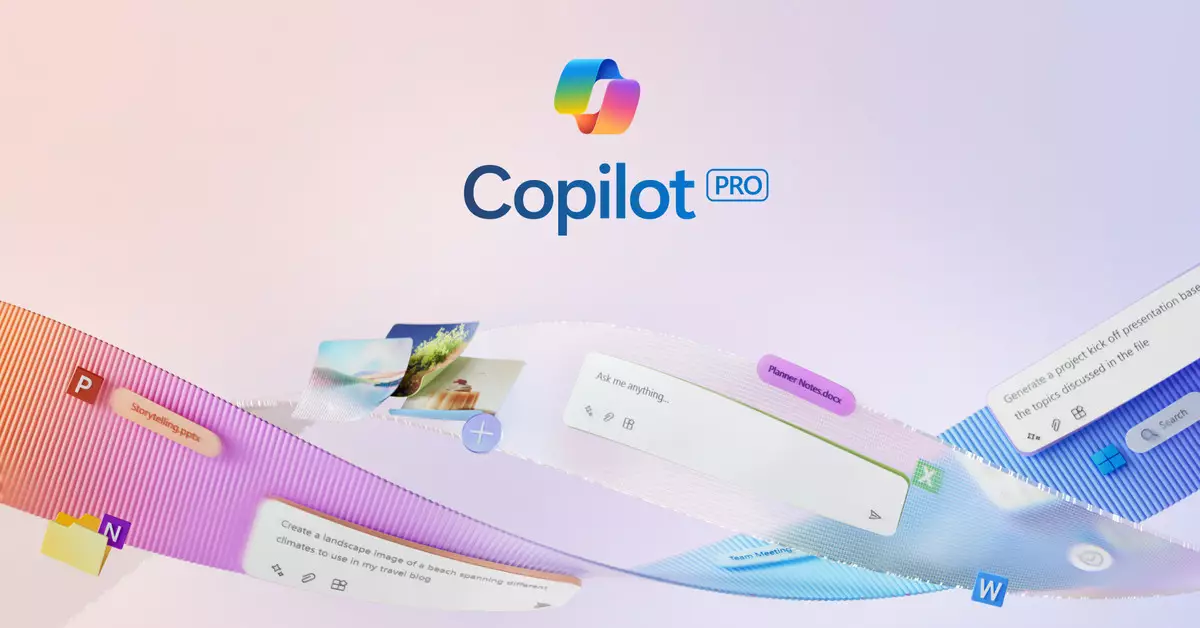In a notable shift in strategy, Microsoft is scaling back on its initial plans to charge an additional fee for AI capabilities within its Microsoft 365 suite. The tech giant recently revealed that it will incorporate Copilot Pro functionalities into standard Microsoft 365 Personal and Family subscriptions, but this offering is currently limited to specific markets including Australia, New Zealand, Malaysia, Singapore, Taiwan, and Thailand. This move marks a significant change in Microsoft’s approach to consumer pricing, especially in light of the previous $20 monthly surcharge associated with accessing these advanced features.
With over two decades in the industry, Microsoft’s inclination towards AI integration has always been a topic of much anticipation. The introduction of the Copilot feature into Microsoft 365 applications like Word and Excel has been particularly noteworthy. In a recent press release, company representatives reflected on the nine-month journey since the inception of Copilot, during which they focused on enhancing performance while actively responding to user feedback. The decision to include Copilot as a part of the standard subscription is indicative of a growing urgency to align their offerings with customer expectations and market trends.
While some users in these preliminary markets will enjoy expanded capabilities with the introduction of the Copilot feature, the trade-off involves some price hikes. Microsoft has announced that existing subscribers will face increased subscription fees upon their next renewal. In Australia, for instance, families will see an additional $4 AUD per month on their Microsoft 365 plans, and personal subscriptions will increase by $5 AUD. This contrasts sharply with the earlier proposition which sought a hefty $33 AUD for the Copilot feature alone.
This shift raises questions regarding Microsoft’s broader business strategy. The company appears to be testing the waters with its pricing models, potentially as a precursor for broader hikes in the US and European markets. This stratagem may signal a shift in how tech companies are aligning AI features with consumer loyalty and willingness to pay. The growing integration of AI in everyday software calls for a reevaluation of the costs associated with these advancements, pushing companies like Microsoft to balance innovation with consumer satisfaction.
Despite the enticing proposition of augmented productivity through Copilot, user feedback has been mixed. Some early adopters have expressed doubts about the actual value it adds to their workflow, questioning whether the additional cost is justified. Personal experiences shared by users have highlighted a sentiment that the AI’s functionality may not substantively enhance their productivity enough to warrant the earlier subscription model. These hesitations are indeed echoed in the tech community, with many opinions circulating that suggest the Copilot feature was excessively priced for the value it offered.
By rolling back the requirement for an additional fee, Microsoft seems to be acknowledging that this feature may have not resonated as powerfully with consumers as initially perceived. The adaptation of their pricing structure not only appears to be a response to direct feedback but also a strategic recalibration in anticipation of a competitive market that is increasingly focused on AI. As technology evolves, user willingness to pay for advanced features must be matched with tangible enhancements in usability and productivity.
In the grander scope, Microsoft’s ability to innovate continuously while maintaining a sustainable pricing model will be crucial to its success moving forward. As it experiments with regional price adjustments and feature integrations, it’s vital for the company to keep its core user base engaged and satisfied. The tech landscape is becoming increasingly crowded, with various platforms vying for consumer loyalty and market share.
Looking ahead, Microsoft must capitalize on learning from its initial missteps with Copilot Pro, ensuring that future features not only enhance their software suite but do so at pricing points that are perceived as fair and valuable by users. The pathway forward will involve a delicate balancing act between innovation, price increases, and ensuring that the advanced functionalities offer practical benefits to consumers looking for efficiency in their daily tasks. As Microsoft navigates these challenges, the company’s strategies will set a precedent for how tech giants manage AI integration within subscription services.

